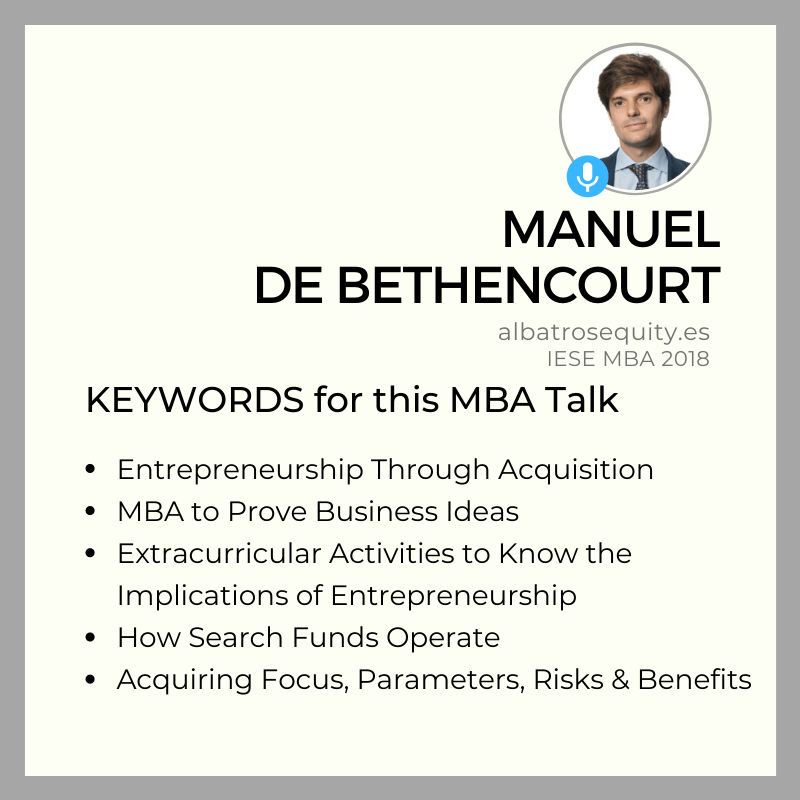
You can be the CEO of a company if you build it, but what if you buy it?
In this episode, we are joined by Manuel de Bethencourt. Manuel is an IESE graduate from 2018.
Manuel is an entrepreneur with a very curious model, Entrepreneurship through acquisition.
Keep reading to understand how he will create a pool of investment funds, buy established companies and enhance, instead of building them from scratch.
- Episode Notes
- Entrepreneurship Through Acquisition
- Working in Consulting & Discovering the Type of Work You Enjoy
- Extracurricular IESE Resources for Networking & Search Funds
- Understanding How Search Fund Works
- Albatros Acquiring Parameters And Preferences
- Starting the Search Fase
- Final Considerations
You can also listen on iTunes, Google Podcasts, and CastBox, or in any other podcasting app by searching for “MBA Talk”.
If you enjoyed this episode be sure to join our mailing list to find out about what books are coming up, giveaways we’re running, special events, and more.
Check out our courses specifically designed for MBAs
Learn how to manage a backlog, workload, hand off activities to a team, differences managing company employees vs contractors and much more!
Coming Soon –> Connect if you want to know more!
Design thinking is all about creating unique solutions to complex problems — no matter how big or small.
Coming Soon –> Connect if you want to know more!
- 2-days long
- Instructor-led
- Management focused
- Methodology to attain goals and solve problems
- Use of real case studies
- Green Belt certification included
Live a day working with the Sprint methodology created at Google Ventures to solve big problems and test new ideas in just 5 days.
Coming Soon –> Connect if you want to know more!
Episode Notes
Entrepreneurship Through Acquisition
Where are you located today, where you’re from and how do you present yourself?
[0:59] I’m located in Seville, in Spain, and I actually from here. I’ve been living in different places. I studied my MBA in Barcelona, but I decided to come back here to start this business we will talk about.
Can you tell me what happened this week briefly that you have to postpone our interview?
[1:24] Yes. I’m finishing the fundraising of this business I’m doing with an asset fund. So I have a lot of meetings, things are changing. And as we will be signing the fundraising next week, I need to coordinate with all the investors, the papers, the policy of attorney and all those things.
What’s your job?
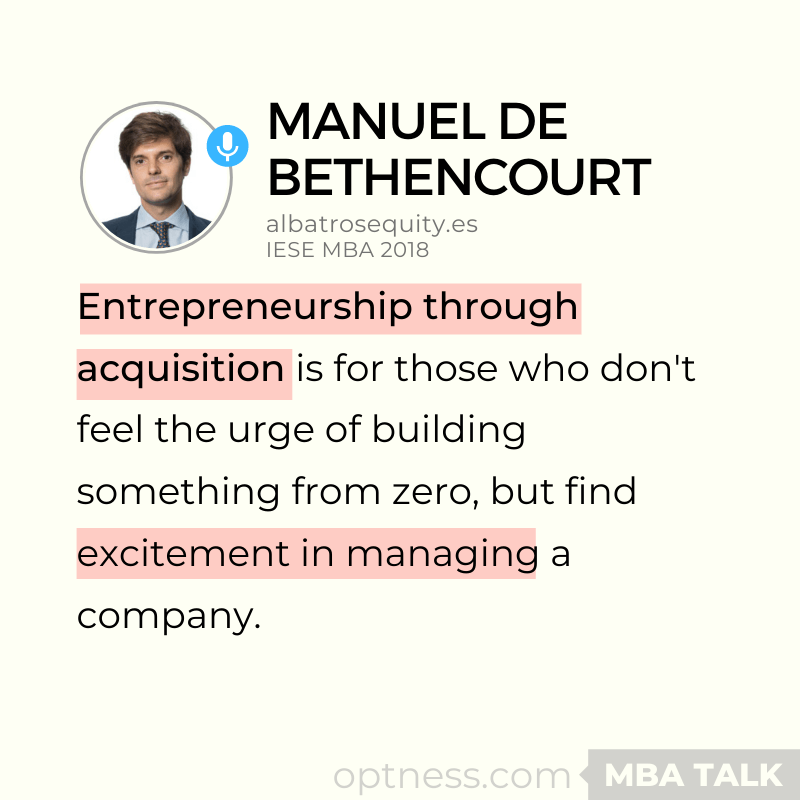
[2:00] I started doing this when I finished my MBA. I decided to start an asset fund. It’s a different kind of entrepreneurship, and I’m just to start developing. It is entrepreneurship through acquisition.
My plan during the next few years will be to have some investors given money to the fund. Also, they will give their time to search for a company that we will acquire and manage during the long term.
Because as I said, it’s a different kind of entrepreneurship. And it’s for those who do not feel the urge, or they don’t find the excitement in the fact of building something from zero, but in managing a company.
Are there any resources you can recommend to start a Search Fund?
[2:52] Yes, there is. This is a model that is starting in Europe. It started some years ago, but now it’s growing, and there are a lot of sources from America. There are a couple of websites like Seed Founders, you can find a lot of information on the IESE website, as they are pushing-up this in Europe. And also on the Stanford website. They have a lot of sources of information about it. I would say the two universities that are pushing this is Stanford, in the US and IESE, in Europe. You will find out a lot of sources if you search Google from the US.
Working in Consulting & Discovering the Type of Work You Enjoy
Before the MBA, what were you doing?
[3:42] Before the MBA, I started working in an audit field in EY (Ernest Young) and I work here into different things. On one side, I started working with audits, mainly focusing on companies going through financial difficulties, and on the other, I focused on bankruptcy procedures. I was based in companies that were growing through bankruptcy.
That was three years of my life here in Sevilla, then I decided to move to London after that. Then I spent a couple more years working for EY, focusing this time in bigger companies in the stock market. That’s what I did before my MBA.
And something that I like to highlight is that even when I started to work, I knew I had the feeling and the idea that I wanted to start my own business. I planned it from the beginning. I planned to win a couple of years of experience until I felt I’ve had something that I can add. Then I started my MBA with the idea of starting my own business.
Did you begin the MBA with the idea of becoming an entrepreneur later?
[4:58] Exactly, at that specific moment in time, I had no idea what I wanted to do. But I knew, and I did it with the idea that on my way, during those two years of MBA, I would find an idea or maybe someone that had an idea that I could add or something like that.
That’s one of the reasons to start studying in IESE, it’s because they are really strong on entrepreneurship. In the end, as you can see, I think it was a really good idea.
Why did you do an MBA and why did you think entrepreneurship was good for you?
[5:53] At first sight, you feel somehow you need to prove your assumptions about it. Because when you started the MBA, you may think that you want to do something, and the first part of your MBA, at least in my case, was to prove those assumptions.
I’ve had some hints for example, when I was working, I liked it more working with small companies, where you can have more impact. Rather than when I moved, for example, to London, where I was working in bigger companies. When you are a small part of a huge engine, I’m not so sure I’ve found some hints.
Apart from that, I like to use it as an example, that you can start a business now if you have the idea. I used to have a book where I would like to develop my ideas. These types of things give you hints on what you want to do. If you write your ideas, you will know.
Then after having said that, what I said about the beginning of the MBAs is to prove that’s the path you like. Because sometimes people think that entrepreneurship is creating the new Facebook or something like that, and it’s not.
So in my case, my experience was mainly in the financial services at that specific moment in time. I didn’t have any idea that excited me or any plan. So I knew I needed to complement, first of all, my background and my experience.
On the other side, the MBA helps you a lot when you don’t have a network to discover new ideas to discuss with people. You enter a circle of people that are also excited about the idea of developing a business, and that pushes you even though you may not have any idea. Push you to find your path. I mean, I understand if you have an idea that excites you, and you are clear about that, the MBA may not be the best path for you. It was not my case.
Extracurricular IESE Resources for Networking & Search Funds
What were the opportunities you took at IESE?
[8:22] For example, I would say in IESE I organized a lot of extracurricular events around sales pitch that people from outside the MBA will use to promote their business. Fairs where all the entrepreneurs explain their ideas. Also, they organize conferences with successful entrepreneurs. So if you want to go that way, those things are something that you have to do.
These things at the end will help you to meet people, to open your mind, to discover new ideas that are already working. To discover how their life is because I think this is important.
It is not just about the many people that want to go for Entrepreneurship because it’s cool. But you have to understand what are the implications of Entrepreneurship. And those things help you to see yourself in a place of advice. Whether you want to do it or not.
IESE has a lot of resources for Entrepreneurship and a lot of events. This is a key factor because, in the end, it’s more important what you get in those conferences and those communities, than the knowledge that you acquire during the classes. That is also important.
How did you end up interested in Search Funds?
[9:47]I heard about it later in a conference but differs the way I met search funds, and it was because of a friend from the US. He knew from the beginning when he started the MBA he wanted to start his Search Fund in the US.
His name is Jean-Paul Destarac, and he was a close friend. I started to see what he was doing and getting excited about the idea to start my search fund here in Spain. After a while, he explained more to me. Since I was seeing his progress, I decided to go for it now.
After that, I got involved in conferences and in other things that he has organized around that. The first time that I met him it was because of these displays. In the end, this helps somehow arrange for the idea that being at an MBA, you get involved in an atmosphere, where you get so many ideas and opportunities from all around your class that it is difficult to find in another place.
What were the other ideas you considered during your MBA?
[10:55] I also considered starting my own business, discussed a couple of ideas. But never went fully excited about any of them. I developed some more than others. After that, I considered starting working in a small startup to get involved in those kinds of atmospheres. That was mainly my idea, and I completely discarded working in a multinational.
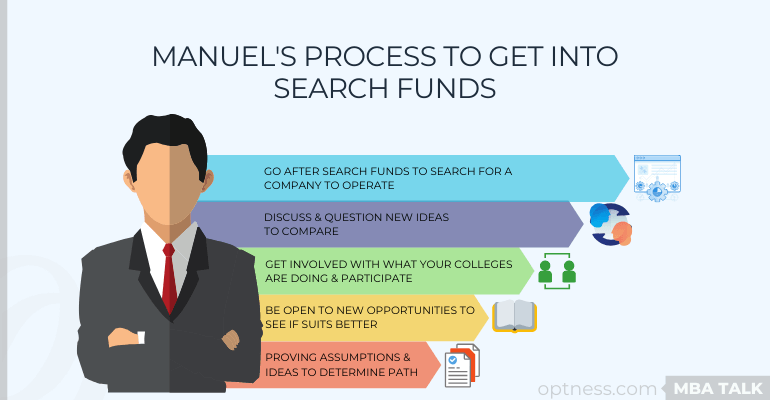
Understanding How Search Fund Works
Does your Search Fund find a company, acquire and at the end run it?
What’s the business model behind it? So you find the funds after you acquire a company like you did this week? What’s the business model? You run the company later?
[11:47] Exactly. So, this is a four-step process. During the beginning of the first stage, you find the investors. They will get involved during the rest of the process, and put their time and money to operate.
That’s the first step, once you find those investors the next step is the one that I’m going to start now. You have to start searching for a company to acquire with that pool of investors. It needs to be a company that has to have some sort of requirement in terms, like with people that wants to retire for any reason or another.
Then once you acquire the company the next step is when you start to operate this business, and it’s around four or five years operating this business. The particularity about this is that you get to start managing the company with the support of those investors the seat on the board of directors.
After four or five years, in this model, many different things have happened. Some people, for example, would like to stay in the company for the long term and others preferred to exit the company. Or there are reasons that allow getting another investor. There is no end to this.
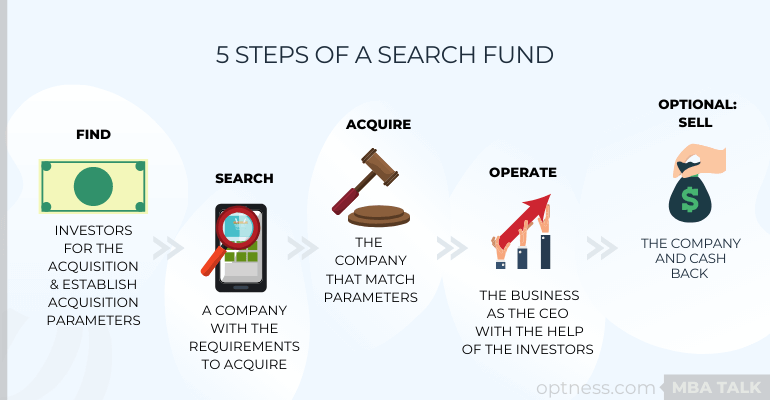
If you like it, you keep it, if you don’t, you change?
[13:21] Exactly, so at the end idea for the investor will be to exit in five or six years, but as manager of the project, I see that people decide to stay for the long term. Either they can get upset about the company or they like it. This is a lot about finding a company that you see yourself managing, and with a lot of potentials to grow. So it’s an exciting position to study for five years If he wants to continue with it or they decide to exit and getting both in another Venture.
Is this one of the easiest ways to get into the CEO position?
[14:00] Exactly, it’s fast-paced in the end. This is a way to get support from investors. I’m somehow a talented MBA, Jean too is a talented MBA, and we somehow lack the experience of managing companies and by supporting them to manage companies, cover those gaps.
Albatros Acquiring Parameters And Preferences
What are the parameters to acquire a company?
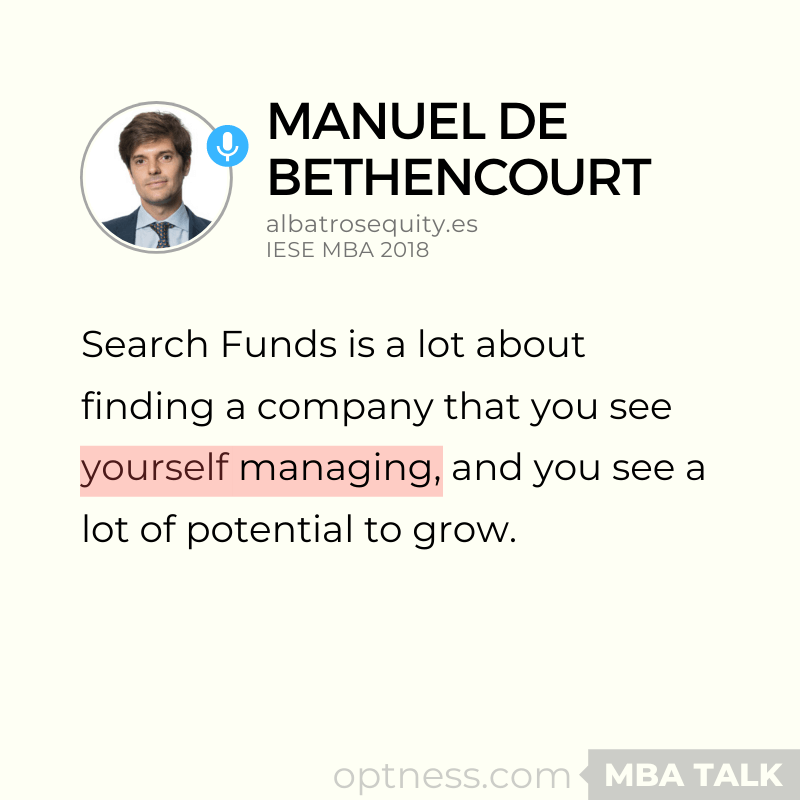
How do you go after companies like I imagine the founders, they prefer certain types of companies than others, some industries than others. Do you have any filtering?
[14:36] That’s the part of the plan that you present and prepared with investors at the beginning. You define the parameters for the companies that you would like to find or to acquire. Their financial parameters, for example, we are more focused on small and medium-sized companies that are on the service focus, rather than manufacturing or in some manufacturing niche. With the potential to grow or with a growth history and a good margin. So you define the tactics before you get the investors.
What is your industry of preference?
[15:21] I have two industries I’m focusing on and this is not a limitation because as you can imagine, I’m not limited to those industries. But the ones that I will push more for are Technology & Information on Communication and Healthcare.
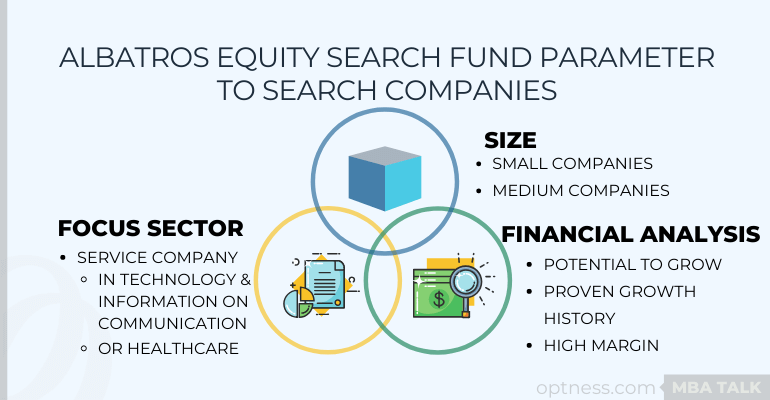
Why going solo?
Why going solo? Doesn’t make sense to have a co-founder? It makes sense to get a co co-founder or a partner in this type of activity or not?
[15:55] I think I did it this way because it’s how it happened. But I will say if you have someone, it’s clear that it is smoother because in this path you can feel alone. And with whom you have a clear alignment, and feel that it will work in the long term, you may decide to go with him.
It was not my case, I started by myself, and didn’t find anyone that was completely aligned with me. I didn’t force it to be. And any kind of Entrepreneurship is a long path. If you get the involvement with someone in this venture, you have to be sure about the alignment of interest in the long term.
What are the risks and benefits of buying small businesses and running them?
[16:57]For me, the opportunity is clear. There is a market for small and medium-sized companies with a lack of professionalization or maybe any other reason from which you can create a lot of value from them in the end. Those companies are not that big to be in the look of other private equities or industrial buyers.
Since there is a lack of professionalization, most of the opportunities that you can create a lot of value on companies are to push for professionalization, you can also push for growth and put it in the loop of those big investors.
The risk, of course, it’s implicit in the fact that it’s easier to make growth with a big company rather than with a small company.
Sometimes a small company does not have steeped, the base, the growth, the roots to continue growing by itself and the name and brand. And all these things are to allow them to have that protected niche. But In the end, the idea is to raise year-a-year, considering that every company is different, the risk attached to any of them will be unique.
I think this model works well in the sense that you have to think that in those companies, small ones, the investors that will get involved are entrepreneurs.
And the investors that I met are fine entrepreneurs, successful entrepreneurs, successful directors, owners of a business, so putting those guys on the board is a clear success win.
What’s the most difficult: finding the investors or finding the company?
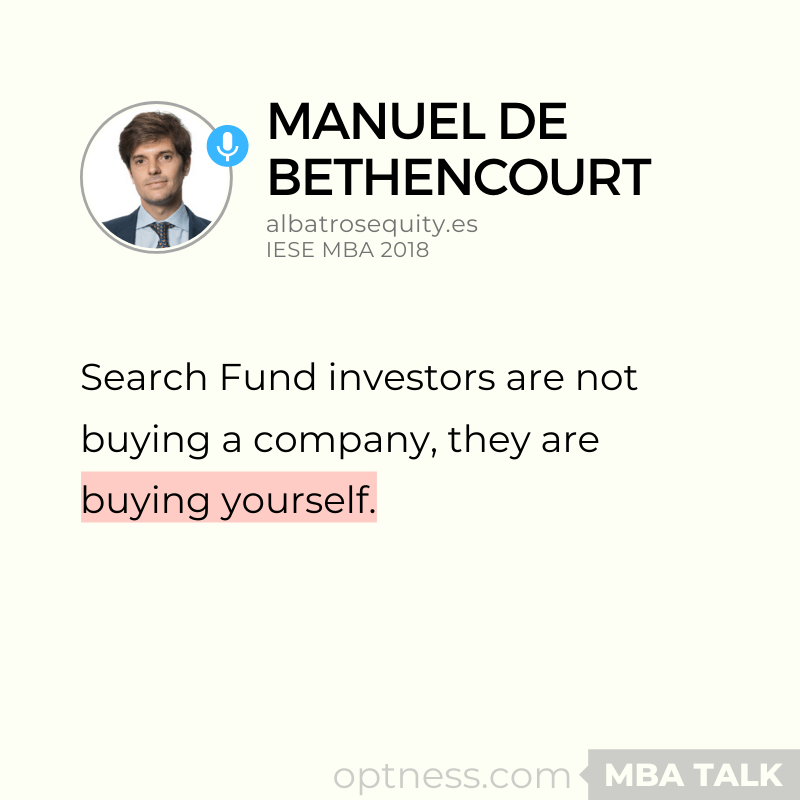
[18:52] I would say it’s finding the company, actually, because finding the investor is just the beginning. If you can convince, if you believe in your model and push for it, you will have no problem finding investors, and do the base or finding the market. They are not buying anything, they are buying yourself. If you prove that you are the right person for that, you will have no problem expressing the memorandum.
Then the second part is the toughest part because there are many companies in the market. You have a limited budget to find those companies, which means you have a limited time to find them and each company has a different situation.
You have to manage your time, you have to be careful not to spend that time in a deal with an organization that might not go anywhere. Sometimes the sale is complex. You may not find the kind of company that you like. I think there are a lot of opportunities, but you have to dig a lot to find.
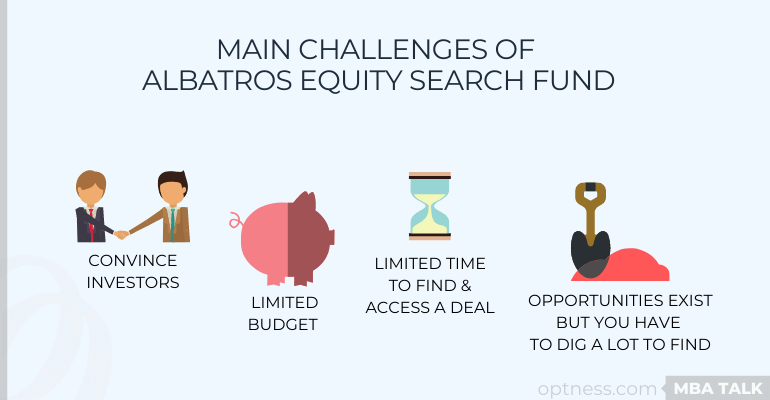
Starting the Search Fase
How much did it take for you to find this deal? Since you found the company this week, are you in the second part now?
[20:06] Yes. The fundraising and signing are in the next few weeks so I will start the second part now. First, I will tell you a little bit about how this works.
When I finished the MBA, I started developing the project, planning the way to define everything and how it’s going to work. Then after this, in mid-September 2018, there was a conference at IESE, and I started to fundraise at that conference. This was in the search fund conference (IESE Search Fund Conference) that they organize every four years.
After that, I did fundraising until January when I finished finding all the investors. From January till now what I’ve been doing has been preparing all the constitution of the company, and the signing agreements around that.
So now it’s the tough part?
Well is the tough part and the most beautiful part. The process at the end has allowed me a lot about being in industry to speaking with people and owners, internet brokers, intermediaries. So it’s a really exciting part of the business, you end up knowing a lot about different industries dealing with them.
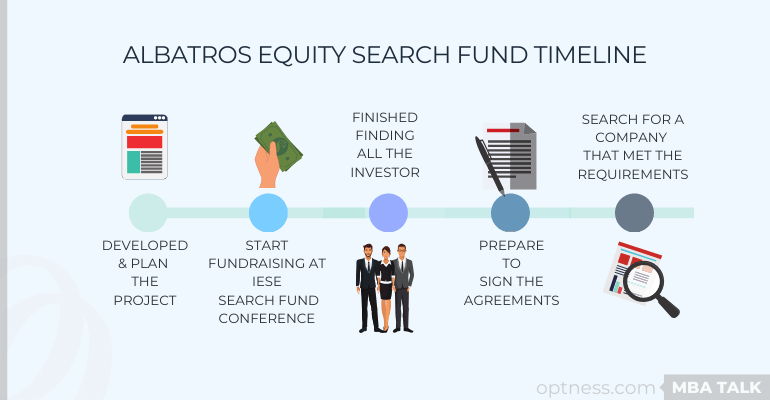
Final Considerations
Would you do your MBA again? Would you change anything about your experience?
[21:37] I would do the MBA again for sure. There is no doubt that I will that again, this is one of the best decisions I have taken in my life, and I will not change it. Of course, I will change some things. In the end, the MBA goes so fast, that you miss a lot of opportunities to do things. I’m really happy about what I did in the end.
Do you have any tools that you prefer?
[20:20] The tools that I use because of the specificity of these projects are everything that I learned in corporate finance. Because I need to analyze those companies, value them, analyzing the business part and financial. I will not say I use a specific thing, because I also use Porter’s Forces to analyze the difference there. So, I use a little bit of everything, to do the diligence, to understand the industry in the company.
Do you have any backup plan if this doesn’t go as you expect?
[23:10] I don’t have any specific backup plan because I trust it will work and I will push everything to work. But of course, if it didn’t end working. No doubt that I would find my way, and I would find another project to work.
Is there anything you’d like to add?
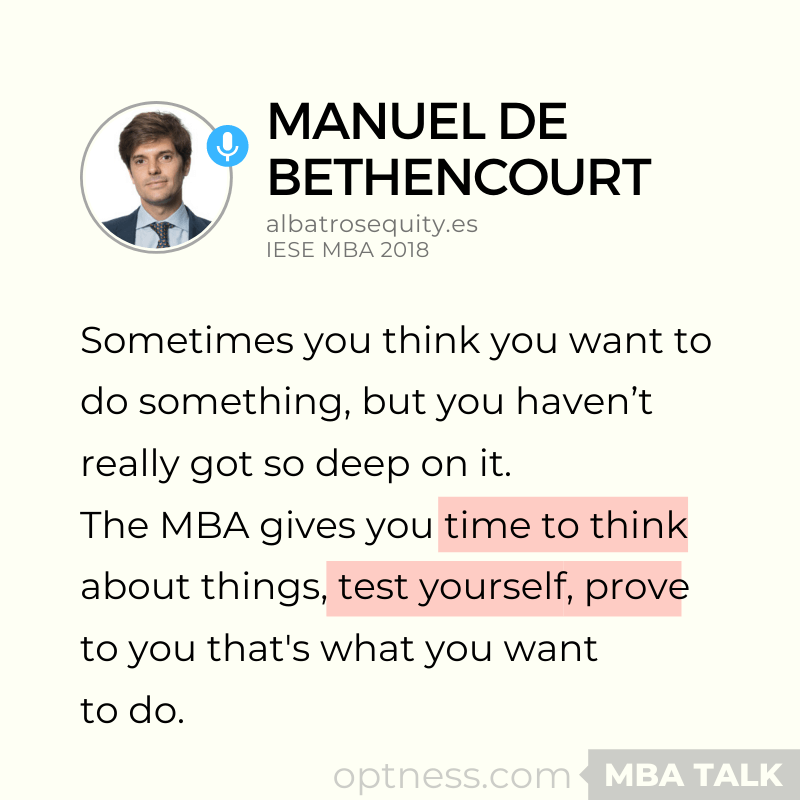
[23:32] I think I did say it at the beginning, before doing an MBA, the first thing that you have to do is about understanding what you want to do. Because sometimes you think you want to do something, but you haven’t really got so deep on it. And the MBA gives you time to think about things, test yourself, prove to you that’s what you want to do.
After that, you have to keep focused on that. You may get lost during your MBA, while you see other people doing many different things. But if you want to do that, you have to keep focused on pushing up to the way that you want.
Is it Search Fund one of the less risky ways to go after Entrepreneurship?
[24:28] Completely yes, Search Fund is the binomial between risk and benefit and is a venture that you don’t need to start from the beginning. No doubt about it
—
Thank you all for reading this inspiring story of Manuel de Bethencourt and I appreciate the interview.
Thank you for joining me for this episode of the MBA talks, a podcast brought to you by Optness Institute. You can find all Notes of the other episode, as well as SUBSCRIBE for future episodes at optness.com/mbatalk. And if you’re enjoying the materials and have any comments, topics, or suggestions, I love you to shoot me an email. My name is Andres and you can write to me at mbatalk@optness.com. With that, thank you and we’ll see you in the next episode
Check out our courses specifically designed for MBAs
Learn how to manage a backlog, workload, hand off activities to a team, differences managing company employees vs contractors and much more!
Coming Soon –> Connect if you want to know more!
Design thinking is all about creating unique solutions to complex problems — no matter how big or small.
Coming Soon –> Connect if you want to know more!
- 2-days long
- Instructor-led
- Management focused
- Methodology to attain goals and solve problems
- Use of real case studies
- Green Belt certification included
Live a day working with the Sprint methodology created at Google Ventures to solve big problems and test new ideas in just 5 days.
Coming Soon –> Connect if you want to know more!